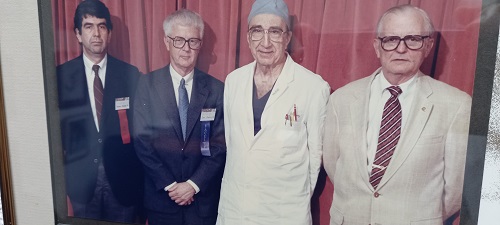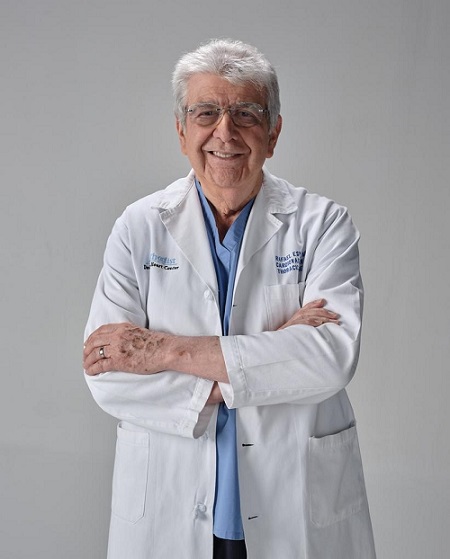STS News, Spring 2022 — A witness to historic surgical advancements, a champion of tide-turning social reform, and the only physician to have served as Vice President of Guatemala, senior STS Member J. Rafael Espada, MD, devotes his days to repairing hearts and reforging the heart of his nation.
Since he began practice in the mid-1970s at the Methodist DeBakey Heart Center in Houston, Texas, and teaching cardiothoracic surgery at Baylor College of Medicine, Dr. Espada felt Guatemala tugging him back home.
His 3-decade career in the US began with a residency in general thoracic surgery at Baylor—where Dr. Espada met the hospital’s namesake and the man who had inspired him to practice medicine, Michael E. DeBakey, MD.
Dr. DeBakey was one of the first surgeons to perform coronary artery bypass surgery and among the first to successfully employ a left ventricular bypass pump; he’s also known for his pioneering work in the development of artificial hearts.

“I remember when I was a kid, seeing an issue of Look with Dr. DeBakey on the cover,” Dr. Espada said. “That magazine, along with Life, was our information line from the US at the time. I knew then that I wanted to do cardiovascular surgery. It was a new field, one that hadn’t yet reached Guatemala.”

After an accelerated primary and secondary education, Dr. Espada enrolled as a medical student at Universidad de San Carlos de Guatemala in Guatemala City. He described himself as “kind of active politically,” and through grassroots advocacy, he developed relationships with international emissaries. In his first year of training, he received a unique invitation.
“The US Ambassador asked me one day if I’d been in the States,” he recalled. “I said no, we’re not very popular there—this was 1965, just after the time of the ’61 Castro invasion. He said they were going to give scholarships to four medical students who were members of the association of medical schools, funded by Kodak and Eli Lilly. They would send us to Washington, DC, for 6 months to see how the government worked.”
Dr. Espada accepted, and while he was in New Orleans visiting Tulane Medical School and Charity Hospital, he picked up a letter directing him to the office where he’d begin his internship. It was the office of Robert F. Kennedy, US Senator from New York.
“I was there with three other kids from different parts of the world, one from Africa, two from Asia. I was lucky to have Bobby Kennedy—he helped me to look at injustices in power, and to see that I was responsible for helping others.”
Dr. Espada, who was raised by a single mother amid stigma and poverty—he didn’t meet his father until he was 55 years old—recalled a tapestry of “two Guatemalas,” one where the rich enjoyed sheltered living flush with new technology, while the country’s poor felt the sting of the nation’s corruption, tax evasion, money laundering, and violence.
Over the next 30 years, by then working and living in Houston with his wife and daughters, Dr. Espada made monthly trips back to Guatemala. He used that time to perform free surgeries for children and adults who had complex cardiothoracic conditions but limited access to sophisticated health care.
Dr. Espada was part of a founding community that established a cardiac program at Roosevelt Hospital, then Guatemala’s largest health care institution. He would perform up to 10 vital surgeries during one trip—and he provided advanced training to the surgeons in residence so that they could perform even more.
With the assistance of the Guatemalan Ministry of Public Health, the cardiac program grew from a six-bed charitable operation to become UNICAR, the Guatemalan Heart Institute, which since its establishment in 1989 has expanded to serve thousands of patients each year, not only in Guatemala, but from neighboring Honduras, Belize, and Nicaragua. Dr. Espada’s training and mentorship continued to bolster the surgical staff, leaving them better equipped with each visit. “It’s only a 2-hour flight,” he said.
These monthly trips didn’t seem to be enough for Dr. Espada. “Every year I would say to my colleagues at DeBakey, ‘I want to move back.’ They said, you’re crazy, it won’t be good for training; the technologies are not current there; the facilities are very poor.”
But that’s precisely why he wanted to return—to flatten the frontiers of those two Guatemalas. “We have a prosperous part with tall buildings and Porsches going around,” he’d said in a New York Times interview in 2007. “Then, 10 blocks away, there’s misery.”
That year, Dr. Espada moved permanently home. And, recognized as a sort of folk hero in his native country—the doctor who performs heart surgeries for the needy—he successfully ran for Vice President of Guatemala. He served in office 2008 to 2012 alongside President Álvaro Colom, on a platform dedicated to boosting the nation’s economy, strengthening international relations, and improving quality of life for its underrepresented citizens.
Dr. Espada spoke fondly of meetings and correspondence with world leaders, including then-Secretary of State Hillary Clinton and Presidents Barack Obama and Joseph Biden, and of the importance of maintaining relationships across countries to identify arenas—particularly in health care, public spending, and climate action—where common ground can lead to programs that uplift people.
"Many in the specialty know Dr. Espada as an established and highly skilled cardiothoracic surgeon in Houston, but may not be aware of the true extent of his influence," said Douglas E. Wood, MD, FRCSEd, from the University of Washington in Seattle. “Dr. Espada has initiated and helps to lead a private foundation that provides education and health care for rural Mayan children. His efforts have affected the lives of millions of people within Central America.”
“Dr. Espada’s selfless leadership transcends his position as vice president of Guatemala and is an inspiration for each of us as we consider the ways we may make an impact on the world,” added Dr. Wood.
In addition to serving as dean of the School of Health Sciences at the Mariano Galvez University of Guatemala, a consultant at the Social Security Systems of Guatemala, and as UNICAR’s senior academic surgeon, Dr. Espada is vice chair of an international think tank, Global Financial Integrity, that uses data-driven analysis to expose illicit financial flows, corruption, illicit trade, and money laundering.
Guatemala has stringent term limits and party restrictions in place to safeguard against dictatorship and nepotism—lessons learned from a tumultuous past, though these limitations play out in intriguing ways. For example, former President Colom divorced his wife, Sandra Torres, in 2011, to give her a shot at the presidential election. Dr. Espada has waited out a similar situation, noting that he couldn’t serve in office because a family member was serving.
But he isn’t done with politics yet. Over the noise and bustle of the heart center, where he still operates at age 78, he confided that some political groups have asked him to run for President in the 2023 election.
“I can’t announce which party yet, because it’s illegal,” he said.
In his aspirations for the future, Dr. Espada emphasized that leaders must pay attention to young voices. The mentality of young people is changing; in fact, the minds of young people are changing, he insisted. In his curriculum is a presentation he calls “New Brains, New Education,” in which he describes how the thought processes of younger generations are wired differently and how educators can evolve their teaching plans to fit newer generations’ learning styles.
“It’s not their job to accommodate older people’s way of thinking,” Dr. Espada said. “It’s our responsibility to adapt to theirs.”
If you know of a unique member experience that should be featured in STS News, contact stsnews@sts.org.